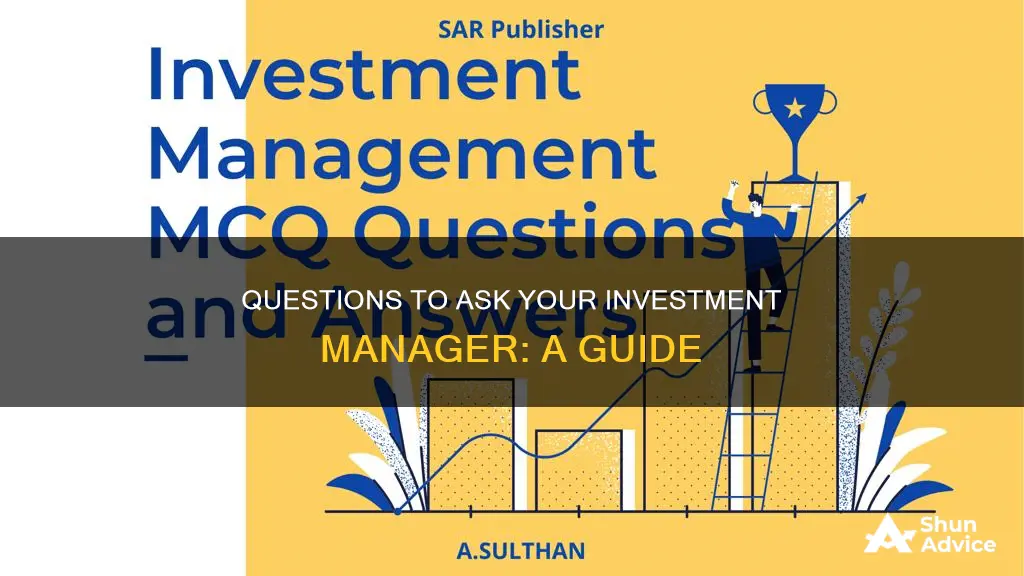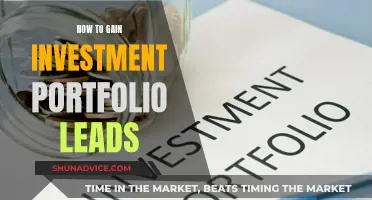
Choosing a financial advisor is a daunting task. It's imperative to ask the right questions to ensure you're getting the best advice for your situation. Before committing to an advisor, you should ask about their qualifications, fees, investment philosophy, and working relationship.
- Are you a fiduciary?
- How do you get paid?
- What are your qualifications?
- How will our relationship work?
- What's your investment philosophy?
- What is your competitive advantage?
- What's your net-zero obligation?
- What are the risks you're currently hedging against?
What You'll Learn

What is your investment philosophy?
An investment philosophy is a set of beliefs and principles that guide an investor's decision-making process. It is a collection of flexible guidelines and strategies that are tailored to the individual's goals, risk tolerance, time horizon, and expectations. It is important to understand your investment philosophy to make informed financial decisions.
When asking an investment manager about their investment philosophy, it is important to understand how they approach financial markets and what strategies they employ to achieve financial objectives. A good investment manager should be able to articulate their investment philosophy clearly and explain how it aligns with your financial goals and risk tolerance.
- Risk Management: Understand how the investment manager prioritizes risk management. Do they focus on preventing losses, or do they take on more risk for potential gains? Ask about their approach to risk assessment and how they make decisions regarding risk tolerance.
- Market Approach: Inquire about their perspective on market efficiency. Do they believe in the efficient market hypothesis, or do they focus on market inefficiencies to capitalize on undervalued investments? Understanding their market approach will give you insight into how they identify investment opportunities.
- Investment Strategies: Explore the specific investment strategies they employ. Do they focus on value investing, growth investing, or a combination of both? Ask about their experience and track record with different strategies and how they adapt their approach based on market conditions.
- Research and Analysis: Understand the level of emphasis they place on research and analysis. Do they conduct fundamental analysis, technical analysis, or a combination of both? Ask about their research process, the types of data they consider, and how they make informed investment decisions.
- Specialization and Consistency: Inquire about their approach to specialization and consistency. Do they specialize in specific industries or sectors, or do they take a more diversified approach? Ask about their investment selection process and how they ensure consistent performance over time.
- Performance Measurement: Understand how the investment manager measures success and evaluates their performance. Do they focus solely on financial returns, or do they consider other factors such as risk-adjusted returns or performance relative to a benchmark? Ask about their track record and request specific examples of successful investments that align with their philosophy.
By asking these questions, you can gain a deeper understanding of an investment manager's philosophy and make a more informed decision about whether their approach aligns with your financial goals, risk tolerance, and expectations.
Equity Linked Savings Schemes: A Smart Investment Guide
You may want to see also

How do you get paid?
When hiring an investment manager, it's important to ask them how they get paid. This is a crucial question as it can help you avoid potential conflicts of interest and ensure that your interests are aligned with those of your investment manager. Here are some things to consider when asking about their compensation:
Fee Structures:
Ask about the fee structure they use. Investment managers can be compensated through various methods, including management fees, performance fees, or a combination of both. A typical hedge fund compensation structure is the 2/20 model, where the manager earns 2% of the assets in the portfolio as a management fee and 20% of the fund's profits as a performance fee. Mutual fund managers, on the other hand, often receive a base salary plus other forms of compensation, such as fulcrum fees, deferred compensation plans, equity and stock options, and performance bonuses.
Fee-Only Advisors:
To keep things simple and transparent, consider focusing on fee-only advisors. These advisors don't receive commissions for selling products, so their recommendations are less likely to be influenced by potential gains for themselves.
All-in Costs:
In addition to the advisor's fees, inquire about any other costs you may incur. These additional fees can add up and reduce your savings over time, so it's important to have a clear understanding of the total expenses involved.
Performance and Returns:
When discussing compensation, ask about the connection between their pay and the performance of the investments they manage. In some cases, investment managers may receive higher compensation when the funds they manage perform well and attract more capital. However, it's also important to clarify if they face penalties for underperformance.
Net Returns:
Ask about the impact of fees and taxes on your potential returns. You want to know what your net returns will be after accounting for all expenses and tax implications. This question ensures that your investment manager considers your tax bill when making financial decisions.
Remember, understanding how your investment manager gets paid is essential for ensuring transparency and aligning your financial goals with their compensation structure.
How to Allocate Your Money: Rent, Savings, Investments, and Utilities
You may want to see also

What are your qualifications?
When hiring an investment manager, it is important to ask about their qualifications and credentials. Here are some reasons why this is important, as well as some suggested questions to ask:
The Importance of Qualifications
Firstly, financial planning strategies change over time due to changes in laws and advancements in research. A qualified investment manager will stay on top of these changes through continuing education, increasing their knowledge and ensuring they are providing up-to-date advice. Secondly, qualifications indicate a certain level of professionalism and competence. This is important because you are trusting this person with your financial future and want to ensure they have the expertise to manage your investments successfully.
Questions to Ask
When asking about qualifications, it is important to understand the specific credentials an investment manager holds, as well as the ongoing education they are committed to. Here are some questions to ask:
- What are your credentials?
- What qualifications do you have, and what do they mean?
- Are you a Certified Financial Planner (CFP)? What ongoing education is required to maintain this credential?
- Are you a member of any professional associations, such as the National Association of Personal Financial Advisors (NAPFA)? What are the requirements for membership and ongoing education?
- How do you stay up-to-date with changes in the industry?
- How do you ensure that your knowledge and skills are current and relevant?
- Do you have any specialised training or certifications in specific areas of investment management?
Remember, the qualifications and credentials of an investment manager are essential in establishing their expertise and ensuring they are providing the best possible service. By asking these questions, you can gain a deeper understanding of their expertise and make a more informed decision about hiring them.
Building an Investment Portfolio: Key Components
You may want to see also

How will our relationship work?
When establishing a relationship with an investment manager, it's crucial to understand how the two of you will work together. Here are some detailed insights and questions to consider regarding the dynamics of your collaboration:
Firstly, define the frequency and means of communication. Will you have regular meetings or check-ins, and if so, how often? Will these meetings be in person, over the phone, or via video conference? Establishing clear communication channels and a consistent schedule ensures you're both on the same page and allows for timely discussions about your investment goals and strategies.
Secondly, inquire about their decision-making process. Ask how they will involve you in making investment decisions and what level of input they expect from you. Understanding their approach helps you gauge the level of involvement you'll have and ensures your preferences are considered. For instance, will they make recommendations and then seek your approval, or do they prefer a collaborative approach where decisions are made together during discussions?
Additionally, discuss the parameters of your investment relationship. This includes understanding the scope of their services and any limitations. For example, are there specific types of investments or strategies they focus on, or conversely, are there areas they avoid? Clarifying these boundaries ensures that your investment goals and their capabilities are well aligned. Ask about the range of products and services they can offer and how these can benefit your specific situation.
Furthermore, it's essential to address the support staff who will be involved in your investment journey. Ask about the team's structure and the roles of other professionals who may contribute to your portfolio management. Understanding the expertise and responsibilities of each team member provides insight into the overall management of your investments. It also ensures that you know the right points of contact for various queries or concerns.
Lastly, discuss the process for reviewing and reassessing your investment strategy over time. Ask how often they typically review and rebalance portfolios and how they approach this process. Understanding their strategy for adapting your investments to changing market conditions and your life circumstances is crucial for long-term success.
By addressing these points, you'll establish a clear understanding of how your relationship with your investment manager will function, fostering a collaborative and productive partnership.
Waste Management: A Smart Investment for a Greener Future
You may want to see also

What are your net-zero obligations?
Net-zero obligations are a crucial aspect of modern investment strategies, and it is imperative that you understand how your investment manager plans to address this area. Here are some detailed questions to ask your investment manager regarding their net-zero obligations:
Understanding Net-Zero Commitments and Progress Monitoring
Ask your investment manager about their net-zero commitments and how they plan to monitor progress towards those goals. Inquire if they have a net-zero roadmap in place or when they expect to develop one. This roadmap should outline specific actions and milestones to achieve net-zero emissions.
Alignment with Global Efforts and Industry Initiatives
Ensure that your investment manager's net-zero obligations are aligned with global efforts to combat climate change. For example, ask if their strategies are consistent with the goals of the Paris Agreement, which aims to limit global warming to 1.5 degrees Celsius. Also, inquire about their participation in industry initiatives, such as the Net Zero Asset Managers initiative, which has committed to supporting net-zero greenhouse gas emissions by 2050 or sooner.
Strategies for Reducing Emissions and Transitioning to Low-Carbon Economy
Question your investment manager about their specific strategies to reduce emissions and transition to a low-carbon economy. This includes understanding how they engage with high-carbon companies. While divesting from these companies is an option, some investment managers may choose to leverage their influence to encourage these businesses to adopt net-zero practices.
Measuring and Reporting Emissions
Inquire about the methods your investment manager uses to measure and report emissions. This could include direct emissions from their operations, as well as indirect emissions from their supply chain and investments. Ask about their plans to reduce emissions across these areas and how they will disclose their progress to stakeholders.
Engaging with Clients and Policy Advocacy
Ask your investment manager how they engage with clients regarding net-zero goals. It is important that they involve their clients in their net-zero journey and provide transparent updates on their progress. Additionally, inquire about their advocacy for policy changes that support the transition to a net-zero economy.
Remember, net-zero obligations are a dynamic and evolving area, so ensure that you stay updated on the latest developments and best practices in this field.
Stability of New York Life Investment Management: Secure Future?
You may want to see also
Frequently asked questions
A fiduciary works in the best interest of the client and is legally required to put the client's needs above their own. They must also limit or clearly express any conflicts of interest.
Financial professionals can have a range of credentials and designations, such as Certified Financial Planner (CFP), National Association of Personal Financial Advisors (NAPFA), or Certified Public Accountant (CPA). Each designation differs in difficulty and continuing education requirements.
Understanding a manager's investment philosophy and strategy is crucial. For example, do they focus on value or growth investing? Do they primarily invest in dividend-paying stocks, small-cap stocks, or mid-cap stocks? Do they time the market or focus on long-term investments?







